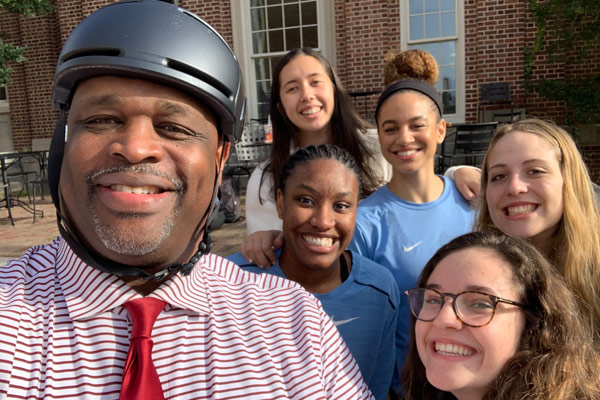
Welcome to “Chiefly Speaking.” The first of what will be an online series where I provide insight and answers on complex UNC Police practices, policy, services, viewpoints and expectations on my watch as Assistant Vice Chancellor and Chief of Police at UNC.
Today, I’d like to briefly discuss our philosophy and application of Community Oriented Policing, or C.O.P. at Carolina. It’s a particularly hot topic, as this underpins not only every single thing we do to keep this community safe but, as importantly, how we go about doing it. C.O.P. has its roots in the 1960s and 1970s law enforcement when successful initiatives reflected a return to beat-based—or neighborhood-based—policing. Officers patrolled assigned areas with regularity and consistency, breeding familiarity and fostering trust with citizens they serve. Even earlier principles of C.O.P can be traced to colleges and universities. Yes, that’s right — the earliest forms of security and community engagement date back to agricultural colleges when “night-watchmen” would stand guard during late-night hours to ensure livestock and research animals were not stolen from agricultural focused colleges. In more modern times it’s not surprising that police-citizen engagement thrived in cities and crime rates even decreased. I consider C.O.P. a “perfect fit” for college campuses, where populations are transient and partnerships are paramount. It’s also step one in our priority of rebuilding that trust that benefits all of us.
“Engagement, trust, partnerships:” these are heavily used buzzwords and no doubt you’ve heard them all before, but I understand that they ring hollow if not put into practice everywhere, all of the time. By practice, I mean results or in the vernacular for today’s generation, “receipts.” This means partnering with our internal and external customers to help prevent crime before it takes place through outreach, visibility, transparency and innovative programming. But our mile-high ideals mean nothing if they’re not reflected in feet on the streets, sidewalks, halls and quads of campus—officers “on the beat” who are visible, friendly, accountable and approachable problem solvers.
What does this mean for you as a member of the campus community?
I was moved by a point made by co-founder of the Racial Equity Institute, Deena Hayes-Greene, who was moderator at the Chancellor’s and UNC Safety Commission’s January 28 “Summit on Safety and Belonging,” citing author, lawyer, and social justice activist Bryan A. Stevenson, who said that one must be “proximate to the problem” to inform real change.
For me as Chief, our commitment to C.O.P. means that I understand how no single board meeting or presentation will immediately meet our goal of healing relationships. My responsiveness and availability must address all students, staff and faculty without exception—not just in boardrooms, not just riding on my Segway around the pit, or in front of larger audiences or even in my office. I believe in management by walking around and maintaining a pulse on the campus community. To make true connections, I want to meet you where you are—where your issues and concerns are.
It also means that I must hold our officers universally accountable to this higher standard with impartiality. Programs that provide a forum for engagement like “Coffee with a Cop” and organic impromptu one-on-one interactions are valuable. I rejoice in recent comments by the Chancellor and others remarking that more and more officers seem to be out on campus, visible, and ready to engage on your terms.
I have yet to enjoy my first spring at Carolina, and I’m looking forward to seeing this campus bloom into beautiful colors around the Old Well, in the Arboretum, and on lush quads. But nothing to me will surpass a view of our officers out on campus eager to meet you, ready and willing to talk, and most importantly happy to help. I’ve reminded my staff that this won’t be easy—trust is too easy to lose and hard to restore. Our opinions are diverse, and at times many of our priorities are different but with the end goal of safety. I can truly say internally there has been a shift since my arrival, I’m seeing officers go the extra mile—miles in fact.
Only in getting closer to the problems do we get closer to the solutions, and that’s a philosophy we can all put into practice.
Thanks for reading, if you want to talk, reach out to me at 919-962-8100 or email me at david.perry@unc.edu. I look forward to speaking with you.
UNC Police Chief David Perry
